The Most Comprehensive CompTIA Roadmap for Cybersecurity Professionals
Today, there are 285,000 job openings in cybersecurity across the US. This number is expected to grow exponentially in the coming years. The demand for cybersecurity professionals is steadily increasing; so is the popularity of CompTIA certifications among professionals and students.
How does one set up a CompTIA career roadmap? Owing to its recognition as one of the best certification providers in cybersecurity, acquiring CompTIA credentials can certainly help you enhance your career. If you are planning on launching or advancing your career in cybersecurity, now is the right time to establish a solid CompTIA roadmap. Keep reading to find out how you can do it.
CompTIA Roadmap for Cybersecurity Professionals
From entry- to expert-level, CompTIA offers a number of certifications; while preparing your CompTIA certification roadmap, it is important to keep this fact in mind. CompTIA certifications are defined and grouped prominently based on the skillset required in each domain. Your CompTIA IT certification roadmap should reflect the respective experience level.
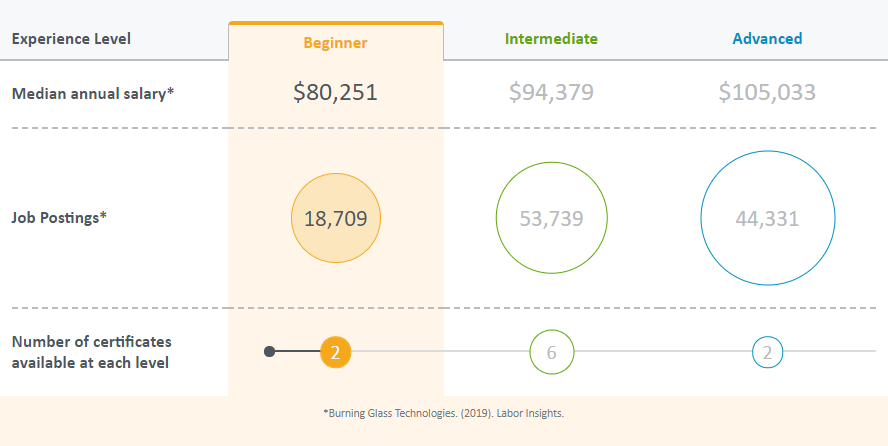
Source: CompTIA
Here is a detailed look at different CompTIA certifications:
Beginner
If you are just beginning to build your career in cybersecurity, CompTIA Network+ and CompTIA Security+ are two ideal choices.
What is the CompTIA Network+ Certification?
The CompTIA Network+ Certification is an in-demand IT certification that validates your skills in networking and developing IT infrastructure. A certified individual has ample knowledge in configuring, managing, and troubleshooting both wired and wireless networks. According to CompTIA, professionals who want to pursue computer networking, network security, and computer support should consider acquiring this credential.
Here are some IT roles can you get with a CompTIA Network+ Certification:
1) Network Engineer: A network engineer is a technical expert who sets up and maintains computer networks. They also offer technical assistance to users, when required. The WiFis, LANs, and WANs that we use on a daily basis are maintained by these professionals.
Average Base Salary = $96,094
2) Network Field Technician: Network field technicians are responsible for the development and maintenance of an organization’s network in the field. They ensure the functionality of networks and the upkeep of hardware, such as computers, phones, cables, routers, printers, and switches. They are skilled at tackling the requirements of clients, both remotely and onsite.
Average Base Salary = $51,600
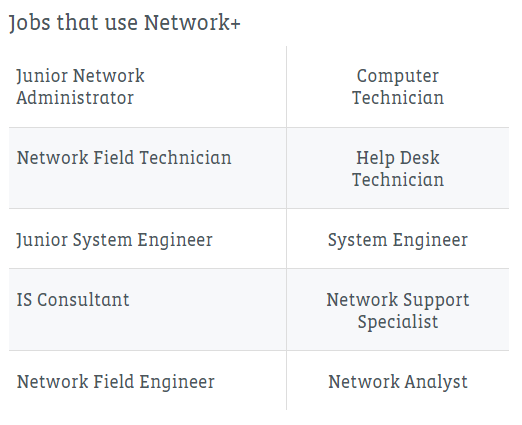
Source: CompTIA
3) Helpdesk Technician: Help desk technicians make sure that technologies used by their organizations are up-to-date and run smoothly. They provide technical and troubleshooting services for both hardware and software. Help desk technicians can work remotely or in-house; while remote technicians assist end-users over the phone or the internet, in-house technicians only cater to the needs of onsite employees.
Average Base Salary = $53,904
4) Systems Engineer: Systems engineers supervise the engineering, management, and business aspects of a system, and ensure that all components work together in harmony. They manage every unit, in an organization, with technical functions. These security professionals also detect risks, analyze them, and make appropriate adjustments in the system to support the project or organization.
Average Base Salary = $80,445
What is the CompTIA Security+ Certification?
The CompTIA Security+ Certification proves your skills in handling core security functions; it sets the foundation for most cybersecurity roles in the market. This credential enables you to execute safe network architecture concepts and systems design. It focuses on the best risk mitigation practices, and mandates hands-on skills to detect and address cyber threats and vulnerabilities.
Here are the best roles you can get with CompTIA Security+ Certification:
1) Security Architect: A security architect maintains the security of computer systems within an organization. They are trained to anticipate the moves of hackers who try to infiltrate systems. With their comprehensive understanding of how the organization’s systems work, they locate weak points. They also establish user policies and protocols, and work hard to maintain and monitor them.
Average Base Salary = $124,960
2) Security Engineer: Security engineers screen and test security systems for potential threats and vulnerabilities. They recommend possible security enhancements, and resolve security threats. These engineers are responsible for testing security strategies, keeping track of network security, and raising awareness among other employees.
Average Base Salary = $102,210
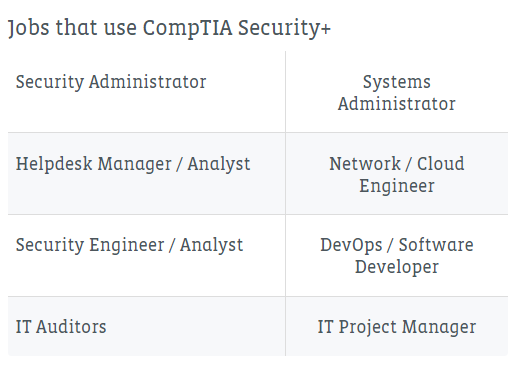
Source: CompTIA
3) Systems Administrator: Systems administrators are responsible for ensuring that networks in an organization are installed and updated properly. One major objective is to get mobile and desktop computing devices to seamlessly share workspace data. They develop WANs and LANs to connect the systems within an organization and troubleshoot glitches that interrupt their smooth functioning.
Average Base Salary = $78,093
4) Network Administrator: Network administrators identify and resolve all possible problems that may arise in computer and network systems. They correspond with clients to understand their requirements, and come up with solutions. These professionals are responsible for monitoring network systems, upgrading software and hardware, and identifying areas of improvement within the network.
Average Base Salary = $69,645
Intermediate
If you already are in a cybersecurity role, consider the following certifications: CompTIA CySA+, CompTIA PenTest+, and CompTIA Project+. Here is a detailed look at what each certification entails:
What is the CompTIA CySA+ Certification?
The CompTIA CySA+ or Cybersecurity Analyst Certification makes you capable of identifying, fighting, and preventing cybersecurity attacks. A CySA+ certified professional achieves this by performing continuous monitoring and assessment of systems. This credential focuses on state-of-the-art security analysis, IT regulatory compliance, automation, threat hunting, and software security.
Here are some top IT roles you can get with a CompTIA CySA+ Certification:
1) Cybersecurity Analyst: Cybersecurity analysts protect and defend the IT infrastructure of organizations (both hardware and software). They monitor systems and networks, analyze alarms, escalate attempts of intrusion, and resolve them. To stay ahead of the game, cybersecurity analysts are expected to be up-to-date on advancements in the field of cybersecurity.
Average Base Salary = $76,575
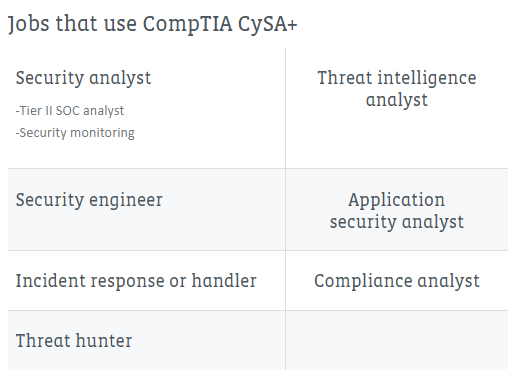
Source: CompTIA
2) Security Operations Center (SOC) Analyst: SOC analysts are part of the SOC team, which constitutes multiple security professionals and analysts. They monitor threats to protect the organization’s IT infrastructure. These professionals carry out multiple critical security tasks by collaborating with other security professionals and looking out for weak points, threats, and vulnerabilities.
Average Base Salary = $67,711
3) Vulnerability Analyst: Vulnerability analysts have a knack for detecting problems in IT infrastructures and finding solutions for them. They develop risk mitigation strategies, create and maintain vulnerability management policies, and define the requirements of the organization for IT security. These professionals can either work in-house or act as consultants.
Average Base Salary = $102,309
What is the CompTIA PenTest+ Certification?
The CompTIA PenTest+ Certification focuses on the most updated version of penetration testing, management skills, and vulnerability assessment. Certified individuals have the skills to customize assessment frameworks and effective communication skills to recommend ideal strategies for improvement.
Here are the best roles you can get land with a CompTIA PenTest+ Certification:
1) Penetration Tester: When penetration testers work for organizations, they are an integral part of the in-house cybersecurity team. These professionals are most sought-after in industries that deal with large amounts of sensitive, classified, or proprietary information. They leverage hacking tools to simulate potential attacks and generate reports to tackle them, if they occur.
Average Base Salary = $118,666
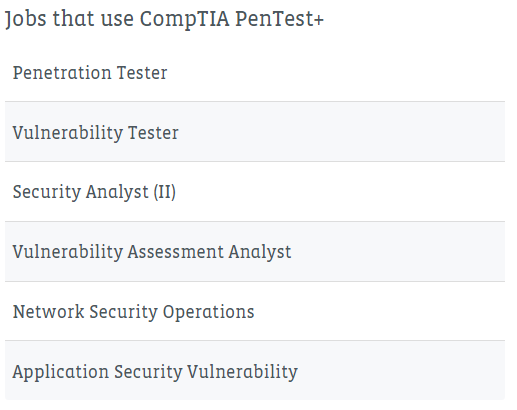
Source: CompTIA
2) Threat Intelligence Analyst: Threat intelligence analysts focus on the process of identification, analysis, and distribution of intelligence. They leverage their foundational knowledge in science, technology, computer, and programming to mitigate risks. They are also adept at identifying the vulnerability points in an organization’s IT infrastructure.
Average Base Salary = $74,262
3) Network Security Operations Engineer
Network security operations engineers work alongside security administrators to secure an organization’s IT infrastructures. They make use of very diverse products and technologies to achieve this security. These engineers perform security reviews, risk analysis, and vulnerability tests, using industry-standard benchmarks.
Average Base Salary = $94,651
What is the CompTIA Project+ Certification?
CompTIA recommends its CompTIA Project+ Certification for professionals who manage simple projects and small groups. It appeals to business professionals who want to learn the ins and outs of managing IT teams. This certification is considered one of the most versatile CompTIA certifications, as it goes beyond just one project management methodology or framework. It covers basic project basics, tools, communication, and constraints.
1) Business Analyst: A business analyst analyzes an organization’s data to look for opportunities and identify areas of improvement. They study business processes to ensure that the technology involved is suited for the business requirements. They understand the goals of the stakeholder and perform data analysis to help the organization make informed choices and decisions.
Average Base Salary = $77,054
2) Project Coordinator: A project coordinator makes sure that a project’s trajectory is healthy and making progress. They plan certain aspects of a project, coordinate meetings, supervise team members, and organize schedules. These professionals are versatile; they are not confined to the IT industry. They maintain project plans and reports, assign tasks, and, most importantly, communicate the progress of the project with the rest of the team.
Average Base Salary = $48,454
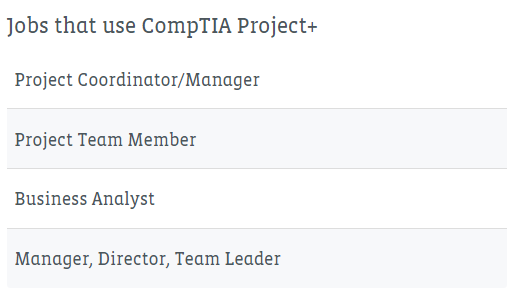
Source: CompTIA
3) Project Manager: Project managers are skilled professionals who inspire the project team to deliver quality outcomes. They are found in all kinds of organizations; they lead the team, organize tasks and subtasks, engage stakeholders, and most importantly facilitate a sustainable environment in which the project team can deliver the product within time and budget constraints.
Average Base Salary = $77,260
Other certifications for the intermediate-level:
1) ISACA Certification
ISACA is a non-profit organization that provides certification in IT governance. Its certifications are ideal for professionals who want to pursue IT governance, systems auditing, security management, and risk assessment. The organization offers four professional certifications:
-
- Certified Information Systems Auditor (CISA)
- Certified in the Governance of Enterprise IT (CGEIT)
- Certified Information Security Manager (CISM)
- Certified in Risk and Information Systems Control (CRISC)
2) GIAC Certification
Global Information Assurance Certification, or GIAC, was formed in 1999 to recognize the skills of professionals involved in information security. This credential validates your skills in the key areas of information and software security. Some areas of expertise covered by GIAC certifications include auditing, cloud security, hacker techniques, forensics, incident handling, secure application and software coding, and perimeter protection.
3) Cisco Certification
Cisco cybersecurity certifications are administered by Cisco Systems Inc., an organization that focuses on networking and communications products. A cybersecurity professional can follow many career paths and earn multiple credentials in the Cisco career certification program. But, key areas covered by the credential are network design and network operations. From entry- to expert-level (architect level), Cisco offers twenty-seven certifications, in total.
Advanced
Are you a seasoned cybersecurity professional? Do you have significant experience developing and executing security systems? If yes, consider acquiring these certifications: CompTIA CASP+ and CISSP.
What is the CompTIA CASP+ Certification?
The CompTIA Advanced Security Practitioner (CASP+) Certification is meant for professionals looking to be highly involved with technology, not management. It recognizes an unbeatable level of competency in risk mitigation, security operations, architecture, research, and collaboration. The certificate is a performance-based credential, strictly for practitioners who get things done as opposed to managers who plan things.
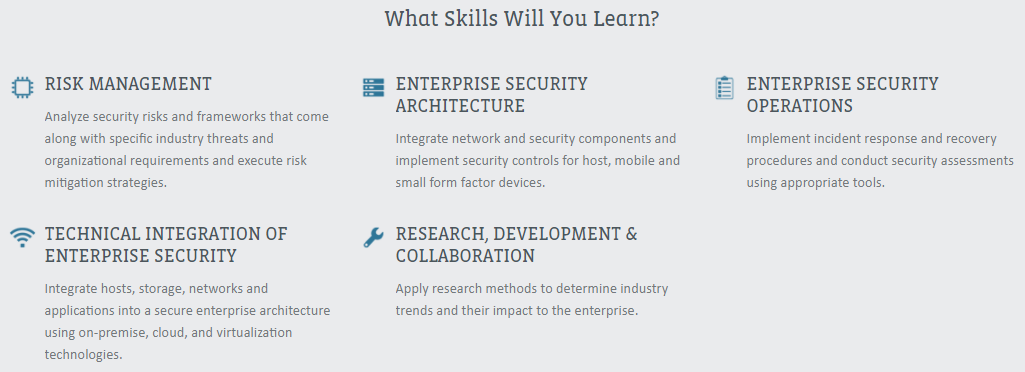
Source: CompTIA
Here are the top titles you can earn with a CompTIA CASP+ Certification:
1) Security Engineer: A security engineer designs, builds, tests, and implements security systems in an organization’s IT network. They have a deep understanding of complex IT systems, authentication protocols, and security standards. They are responsible for reviewing security measures, suggesting enhancements, consistently monitoring network security, running tests, and setting up disaster recovery procedures.
Average Base Salary = $102,472
2) Technical Lead Analyst: Technical lead analysts give guidance on complex technical issues. They are responsible for ensuring that the team members adhere to critical technical decisions. They are skilled at identifying and tackling challenges, debugging software, and troubleshooting issues that impact software development or other engineering tasks.
Average Base Salary = $105,387
3) Application Security Engineer: Application security engineers work with developers to establish security control measures for an application. They set up checkpoints to make sure that security is uniform across all domains of an application. They are responsible for checking source codes for vulnerabilities, implementing advanced security features, managing user authorization, and maintaining technical documentation.
Average Base Salary = $100,361
What is the ISC2 CISSP Certification?
Administered by ISC2, the Certified Information Systems Security Professional (CISSP) Certification is the gold standard for advanced IT security. It is globally recognized and recommended for seasoned security professionals who want to enhance their careers. Not only does the credential give them access to more opportunities, but it also is an effective way to land high-earning IT cybersecurity jobs. The CISSP Certification validates your flair for designing, developing, and implementing top-notch security programs.
Here are the top cybersecurity jobs you can earn with a CISSP Certification:
1) Information Security Manager: Information security managers are responsible for safeguarding an organization’s network, computers, and data against viruses, security breaches, and hackers. If these professionals fail, an organization could lose valuable data and revenue. They assess security measures and study reports, generated by security systems, to reinforce safety and security.
Average Base Salary = $134,503
2) Chief Information Security Officer: Chief information security officers conduct real-time assessments of threats, and keep organization leaders in the loop regarding potential risks. These security officers also act as watchdogs in the organization by preventing employees’ misuse of company data.
Average Base Salary = $166,353
How Can Budding Cybersecurity Professionals Choose the Best CompTIA Roadmap?
Why should you plan your CompTIA roadmap? With the increasingly intense competition in the cybersecurity field, it is good to have a solid plan in place. To determine your goals and aspirations, executing a plan is the most viable option during this uncertain time. After all, nobody understands what you desire better than you do. So, if you are an aspiring cybersecurity professional or a seasoned professional who wants to move up the ladder, create a well-thought-out CompTIA roadmap.
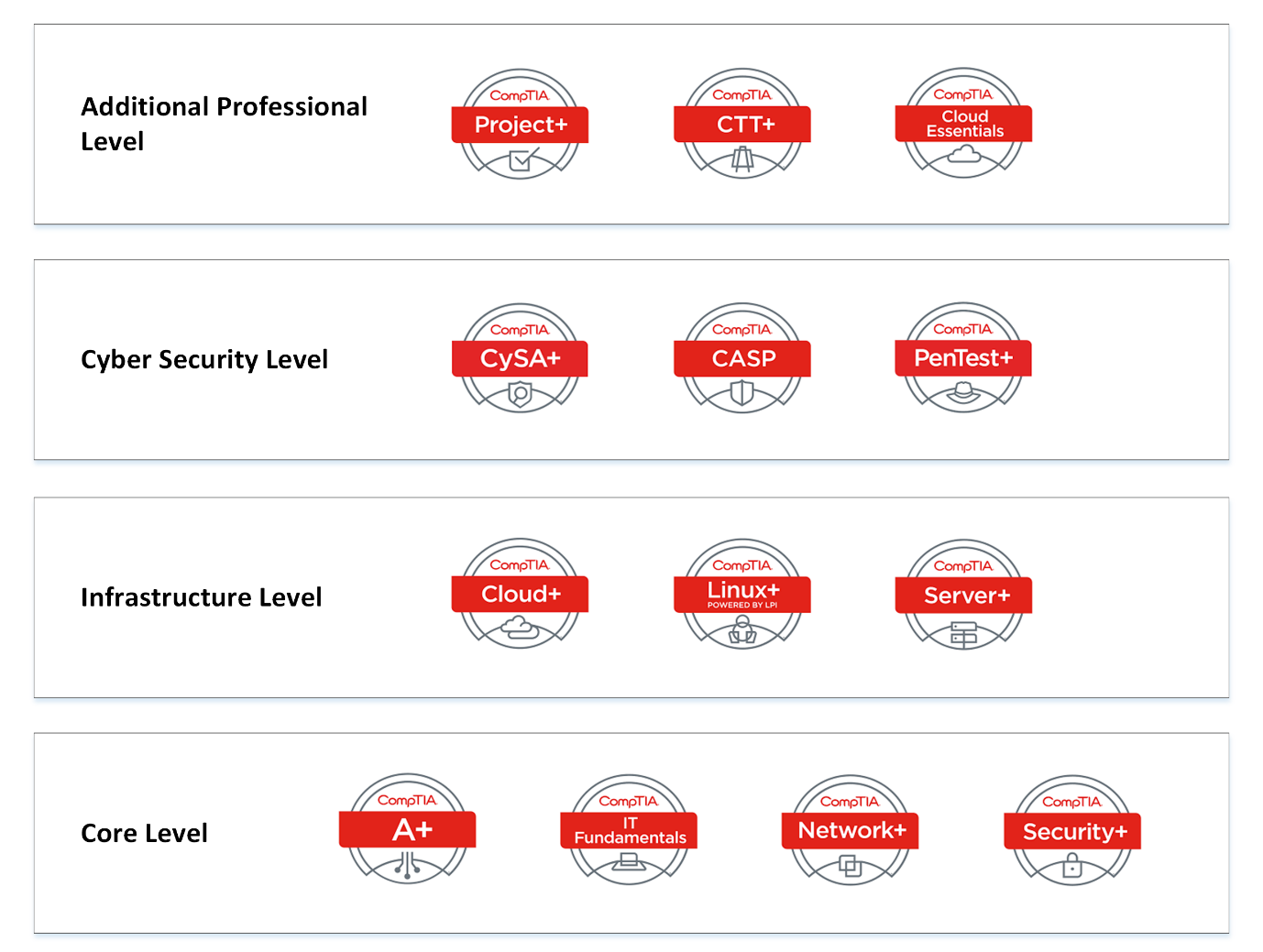
Source: GreyCampus
Here are some crucial tips to help you choose the best CompTIA roadmap:
- Identify your niche ─ Try to find out what area of cybersecurity interests you the most. Find out in which domain you would like to specialize.
- Understand the prerequisites ─ Some job titles require certain credentials; the trick is to research the job titles you are interested in and find out their prerequisites.
- Acquire hands-on experience ─ No matter which domain you are fascinated with, hands-on experience will give you an edge over the competition.
- Be flexible ─ The IT job market is ever-changing. It is important to stay up-to-date with the trends.
With a realistic, effective CompTIA roadmap, you can achieve a broader perspective on where you stand on your career ladder, make job transitions appropriately, earn more, and, most importantly, be satisfied with your career.
But, while planning your CompTIA roadmap, make sure you understand the difference between the CompTIA career roadmap and the CompTIA IT certification roadmap. How is a career roadmap different from a certification roadmap?
In the CompTIA career roadmap, you accomplish the following:
- Perform a self-assessment of where you stand in your cybersecurity career
- Identify potential opportunities in the cybersecurity industry
- Pick out the best strategies to help you achieve your career goals
- Hunt for jobs
The CompTIA certification roadmap, on the other hand, is essentially a structured list of certificates. It starts at the beginner level and ends at the expert level. This path acts as a guide for you to understand what credentials you need to acquire to move up your career ladder.
If you are looking to get CompTIA-certified, get started with GreyCampus, a premier provider of cybersecurity certifications. Its CISSP, CompTIA Network+, CompTIA Security+, and CompTIA A+ certification training programs guarantee live bootcamps, hands-on experience, expert guidance, and mentorship. If you are a seasoned cybersecurity professional, GreyCampus’s CISSP Certification Training program is the ultimate choice to boost your career.
Want To Get CompTIA-certified? Join a Bootcamp Today!
